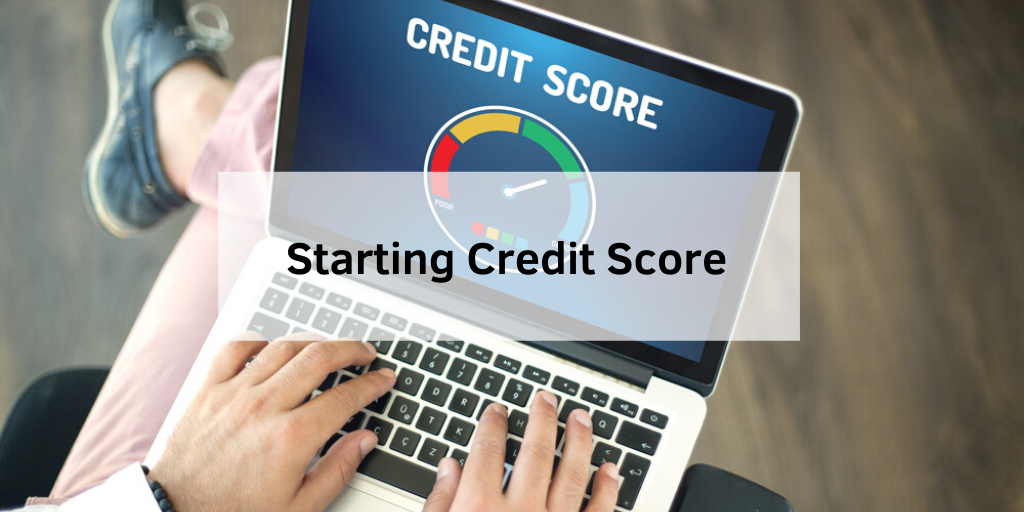When embarking on your personal finance journey, the idea of a credit score may seem confusing. Your credit score has a large impact on your financial and lending future.
What credit score do you start with when establishing your credit?
Keep reading to learn all about credit score, your starting score, and how to build your score from scratch!
What is a Credit Score?
First things first, what is a credit score? And why is it so important?
Simply put, a credit score is a number that reflects the financial trustworthiness of an individual. The more likely a person is to pay back borrowed money, the higher their score will be. Credit scores can range from 300 to 850, which is considered perfect credit.
Here’s what each credit score range means:
- Excellent: 800 – 850
- Very Good: 740 – 799
- Good: 670 – 739
- Fair: 580 – 669
- Poor: 300 – 579
How Are Credit Scores Calculated?
Credit reports provide data about a person’s financial history. Five key components are used to determine a person’s credit score:
- Payment History: Lenders want to ensure a borrower is reliable and on time with payments. This area of the credit report displays whether an individual consistently pays credit bills on time or if they make late payments.
- Amounts Owed: This is also known as credit utilization. It looks at how much credit is available to a person and how much of it that person is using.
- Credit History Length: This examines how long each credit account has been open and how long it has been since each one was utilized. It can provide a longterm picture of a person’s financial habits.
- New Credit: This metric looks at the number of accounts a person has recently opened as well as those they have applied for. Opening many accounts in a short time frame can signal that you are a risk to lenders. Therefore, those with a short credit history should avoid doing this.
- Credit Mix: Credit mix refers to the different types of credit you have taken out. Student loans, mortgage payments, and auto loans are some examples that get factored into the mix. If you do not have a long credit history, the credit mix will be given more weight in determining your credit score.
What Credit Score Do You Start With?
So, what credit score do you start with? It’s actually none at all. Credit scores are based on reports from credit bureau data. Thus, they can’t generate a score for someone who has never had credit. Until you’ve had some form of credit in your name for at least six months, you will not have a score.
Having no credit score may sound harmless. However, this can impact you negatively as lenders have no way of measuring your risk. Without a credit score, you will likely pay higher interest rates, or you may even get turned down for loans altogether.
But there’s good news! Having no credit is better than having bad credit. You have a blank slate and a foundation upon which you can build good credit.
To obtain a credit score, you must open up a line of credit in your name. Once you pass that initial six month period, credit bureaus have enough information to generate your starting credit score. Your first score will depend on the five factors mentioned above. This means the way you handle your credit is pivotal in setting yourself up for a good credit score.
It is very rare to begin with a low credit score. Nevertheless, certain practices can send the wrong message to lenders and weaken your initial score. On the other hand, prudent financial moves can help increase your score.
Read on to discover best practices for building a great credit score if you’ve never had credit.
How To Build Your Credit Score From Scratch
There are some simple ways you can build good credit fast, so you are more trustworthy to lenders. For example, make all your credit card payments on time and use less than 30% of your credit limit. Here are some other tips to help build your new credit:
- Apply for a secured credit card. A secured credit card requires a cash deposit when the account is opened. The amount you put down will typically equal your credit limit. If you pay your credit card bill on time each month, you’ll get that deposit back. If you do not, the lender can withdraw the money from your account. Simply pay your bill on time each month to build credit.
- Get a Cosigner. Another way to maintain a good credit score is to ask a financially responsible adult to cosign for you when you take out a loan. A cosigner will take the brunt of the financial burden if you are unable to make payments. This option allows you to pay lower interest rates and apply for cards that may have turned you down had you applied without a cosigner.
- Landlord Reporting. Do you pay rent on time each month? This can show lenders how responsible you are. You can request that your landlord report your payment history to credit agencies. This is a great option to begin building credit without applying for a loan or card.
Want to Learn More About Building Yout Credit Score?
Establishing and building credit is not as intimidating as it first appears. Slowly but surely, you can build a great credit score. Need more advice?
Check out this beginner’s guide to credit to navigate the world of credit with confidence!
Go Clean Credit is committed to helping individuals restore their credit and pursue their financial goals. Since 2003, Go Clean Credit has helped thousands repair credit issues and build up low credit scores.
Go Clean Credit realizes how stressful and challenging credit problems can be. That is why they offer support from credit specialists who are knowledgeable and well versed in the industry.
If you need aid, don’t hesitate to contact the dedicated professionals at Go Clean Credit!

